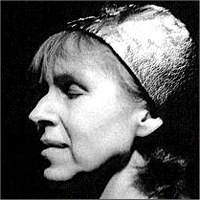Maggie Nicols
// vocalistMAGGIE NICOLS is an activist, actor, composer, dancer, improviser, musician, performer, teacher, and vocalist from Edinburgh, Scotland. Cats Cradle’s “Cats Cradle (Gift Of Time)” (1997) was available from 33 Records, Mike Figgis’ “One Night Stand” (1997), and “Loss Of Sexual Innocence” (1999) were both available from Polygram Records, Ken Hyder, Dave Brooks, and Maggie Nicols’ “In The Stone” (1998) was available from Impetus Records, Loverly’s “Life” (1999) was available from 33 Records, Les Diaboliques’ “Live At The Rinefalls” (2000) was available from Intakt Records, Maggie Nicols, Caroline Kraabel, and Charlotte Hug’s “Transitions” (2002), and The Gathering’s “For John Stevens” (2003) are both available from Emanem Records. Maggie Nicols has also been an active participant in the European improvisational community since joining the Spontaneous Music Ensemble in the late 1960’s. She is a co-founder of the Feminist Improvising Group, working to further women in improvised music and in the creative arts through collaborations and workshops.
Photo: Maggie Nicols
Interview:
“Music is the healing force of the Universe.”
– Albert Ayler (1936 – 1970), avant-garde jazz composer and saxophonist
When I had a deep belief in God, I listened to John Coltrane’s album “A Love Supreme”. Whatever I was doing, when the track “Psalm” came on, I would stop, in a trance, transfixed, and transforming, possessed by the music in which Coltrane’s soul seems to be both yearning for the Divine and totally at peace in it’s presence. Hearing it now, I still feel moved beyond measure even though my feelings about spirituality have changed radically, thanks, amongst other things, to Marxism, feminism, the goddess movement, yoga, and anarchism. Listening and dancing to music, as a young woman, often profoundly affected me in ways in which even time seemed to stand still, what years later I would describe in a lyric as “a moment forever a moment, forever a moment forever”; what yogis and buddhists might call “nowness” or Marxists the glorious contradiction of being “here and not here”. I’m sure on a soul level it’s why I had to become a musician, although it first manifested as intense teenage crushes on musicians before falling in love with their music when I got into Ronnie Scott’s Jazz club in London’s Gerard Street in the early sixties, by any means necessary. It was probably the divinity in music I was really after all the time and there certainly was an abundance of spiritual beauty in much I heard there. Singing standards in London pubs with the late, great pioneer of bebop in Britain, pianist Dennis Rose, was a joy. His love of the evolutionary revolutionary essence of Bird and Dizzy’s music meant that he was a perfect channel for spirit. He could make the most overdone songs sound transcendent without throwing singers off balance.
The most life changing experiences of the spiritual significance of music though was with the late drummer John Stevens and saxophonist Trevor Watts, in John’s group Spontaneous Music Ensemble in 1968. I became The Fool in Tarot, about to walk fearlessly off a cliff into the unknown with total trust in the Universe. It was my first experience of free improvisation and it was bliss. Mind you, I had a crush on John at the time which is probably why I let myself surrender totally to his minimalist, meditational gateways to freedom, like singing one note over and over while Trevor played another one, and John played breathtaking overtones on a gong until this simple repetition unfolded into music of magical complexity where our connection to one another and everything else was total. Nowadays, I experience spirit in music pretty much all the time, particularly at The Gathering, open to all, which started in London in January 1990. Community communication in all it’s creative clumsiness and grace; trusting The Muse, letting the music make us, being touched by divine delirium, talking in tongues, and shape shifting. The late drummer and photographer Dennis Austin, when interviewed about it said “Some people go to church on a Sunday, we go to The Gathering on a Monday”; the spiritual significance of music beautifully expressed.
“Listening and dancing to music, as a young woman, often profoundly affected me in ways in which even time seemed to stand still.”
– Maggie Nicols, vocalist


